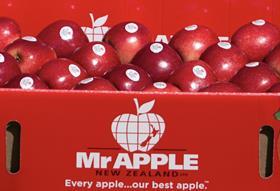
Higher pricing has helped Mr Apple offset lower production volumes this season.
The New Zealand apple grower-parker-exporter’s parent company, Scales Corporation, reported its results for the six months to 30 June 2021 (H1 2021) today (25 August).
Highlights included an underlying EBITDA of NZ $54.8m, up from NZ$49.4m in 1H 2020, while underlying net profit (after tax) came in at NZ$33.3m, up from NZ$28.9m in H1 2020.
“Despite the challenges experienced by each of our divisions, our businesses have delivered an exceptional performance both financially and operationally,” said Scales Corporation chair Tim Goodacre.
“We continue to benefit from our diversified agribusiness approach and from the strategic benefit that Scales Logistics brings to the group. The result is also testament to the outstanding performance of our team and the strong culture within the divisions.”
Scales’ horticulture division delivered an underlying EBITDA of NZ$38m in H1 2021, up from NZ$36.9m in H1 2020.
However, Mr Apple’s total own-grown export volume of 3.6m TCEs (tray carton equivalents) was down from 3.9m TCEs in H1 2020.
“The horticulture division delivered a very strong performance despite being impacted by a shortage of skilled RSE workers together with ongoing disruptions in global markets and supply chains,” said Scales Corporation managing director Andy Borland.
“Volumes were affected by inclement weather in the key growing season. However, higher pricing offset these lower volumes as well as the increased labour and shipping costs that were incurred.”
Asia leads the way
In an interim results presentation released to shareholders, Mr Apple forecast markets in Asia and the Middle East to absorb 69 per cent of its 2021 export crop (by volume, TCEs). Europe (15 per cent), the UK (14 per cent) and the US (2 per cent) make up the remainder of Mr Apple’s export mix.
The presentation said the European market had been impacted by lower available volumes of ‘traditional’ varieties.
“Pricing (for Europe) is above or in line with prior year,” the presentation read. “As a result of a lower anticipated European crop, the sales period for that market is expected to be both stronger and longer.”
The presentation underlined a 9 per cent year-on-year increase in Mr Apple’s production of ‘premium’ varieties, including considerable growth in Dazzle and Posy sales.
An automated future
Mr Apple is part-way through a 10-year investment and automation plan to increase productivity across its business.
Its initial focus is on its post-harvest activities, with the first step being the development of its Whakatu coolstore.
Opened in time for the current 2021 season, the coolstore is delivering a number of efficiencies including reduced power consumption, a reduction in the double-handling of fruit (lowering fruit damage and labour cost), and reductions in transportation costs and carbon emission.
The next stage of the plan is to fully automate Mr Apple’s Whakatu packhouse. The ambitious plan is expected to be completed in the next four years.
“(When completed) it will reduce the number of human touch points as we develop one of the world’s only packhouses to fully-automate fruit handling,” according to the interim results presentation.
“It leads to possible 24x7 packing, which would enable further consolidation of our packing activities and therefore greater freight and labour efficiency across the network.”
Earnings guidance lifts
Due to the strong H1 2020 results, Scales has upgraded its full year earnings guidance.
Underlying net profit is now expected to be between NZ$32m and NZ$37m, implying an underlying EBITDA of between NZ$65m and NZ$72m.
“We continue to anticipate disruptions to domestic and international operations including labour availability, global markets and supply chains due to the ripple effects of Covid-19,” said Goodacre. “This can be evidenced by the current lockdown in New Zealand.
“However, we believe our diversified focus will go some way to mitigate these issues. We are also aware that our ability to operate during lockdowns is not possible without our team, and their health and safety will continue to be our foremost priority.”



